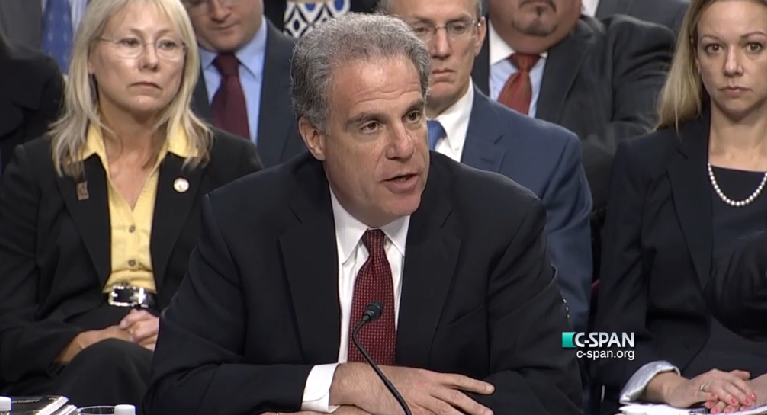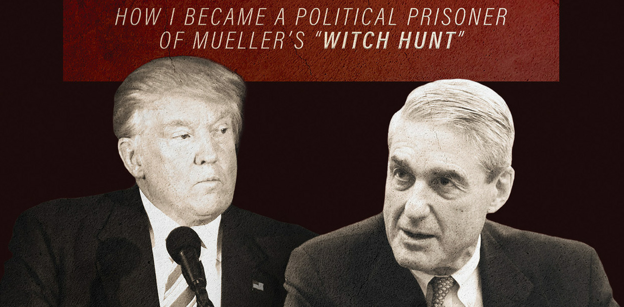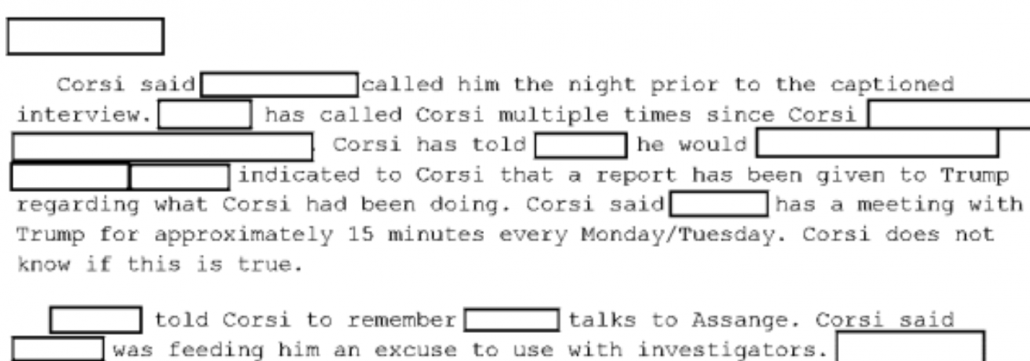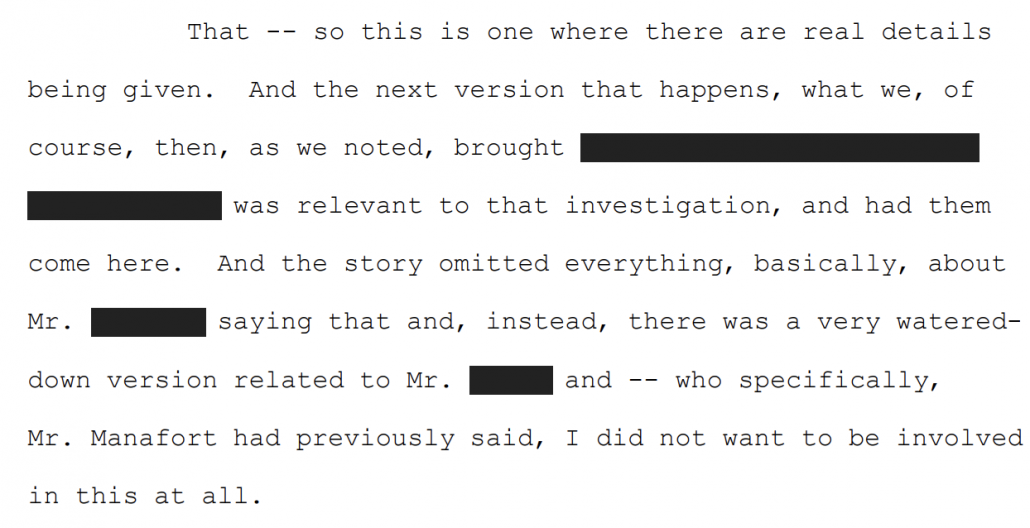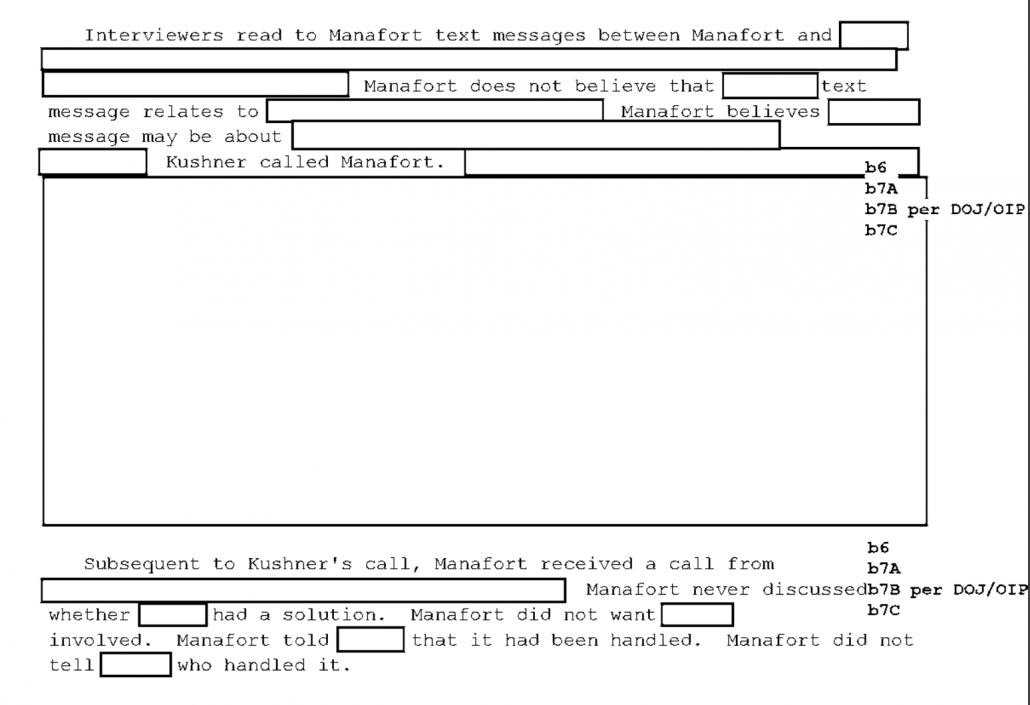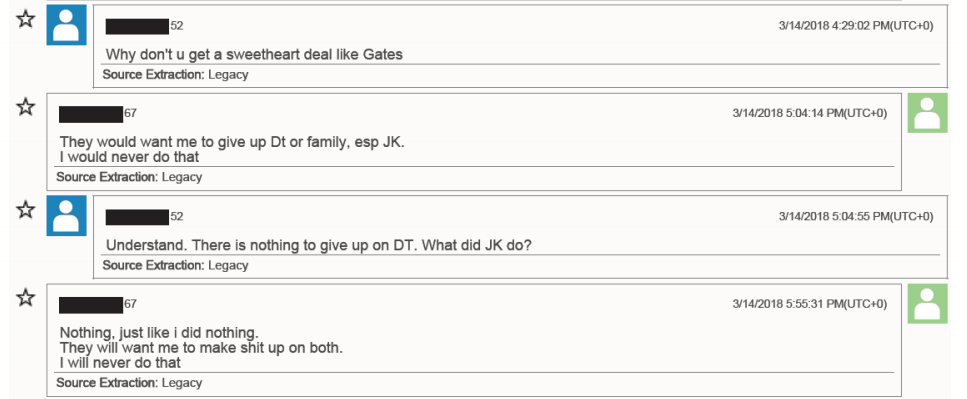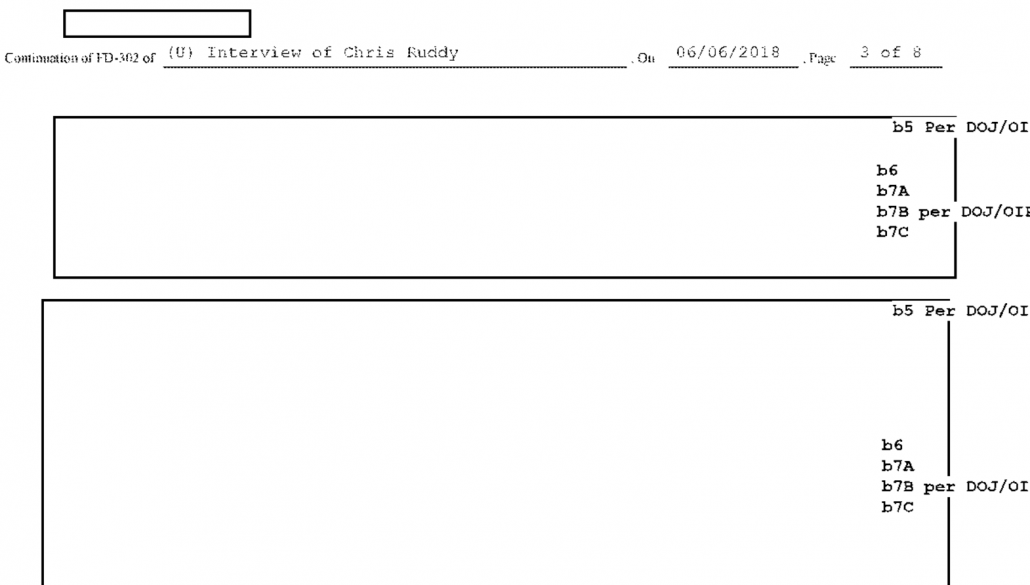Oleg Deripaska was working to weaken Manafort even as he was pushing him to help carve up Ukraine
On July 30, 2016, as explained by the DOJ IG Report on Carter Page, Christopher Steele met with Bruce Ohr in DC. They discussed several things: reporting, paid for by an unknown source, about Russian doping; Steele’s reporting, paid for by Fusion GPS, about Carter Page’s travel to Russia and a claim that Russia had Trump over a barrel; and Steele’s work for one or several Oleg Deripaska attorneys digging up evidence in support of the aluminum oligarch’s lawsuit against Paul Manafort.
Three days later on August 2, 2016, as explained by the Mueller Report, Konstantin Kilimnik met with Paul Manafort and Rick Gates in NYC. They discussed several things: how Manafort planned to win the election by winning PA, MI, WI, and MN; what role Manafort might play in a Russian-backed plan to put Viktor Yanukovych in charge of an autonomous Donbas region that Manafort recognized was a back door effort to carve up Ukraine to Russia’s liking; and how Manafort could fix his urgent financial woes by getting his Ukrainian paymasters to pay money due him and by getting Deripaska to dismiss that lawsuit.
That is just one of the temporal overlaps that make it clear Oleg Deripaska was playing a brutal double game in 2016, pitching a renewed relationship with a financially desperate Manafort via Konstantin Kilimnik at the same time — sometimes even on the same days — when he was offering to provide evidence to the FBI on Manafort’s corruption via Christopher Steele.
Another such overlap came in December, 2016. On December 7, in an interagency meeting, Bruce Ohr suggested the US government engage with Deripaska to learn about corruption — “all the way to the President” — alleged by Steele. The next day, December 8, Kilimnik sent Manafort an email (probably using foldering in a failed attempt to hide it from surveillance) where he pitched Manafort on leading the Ukraine peace deal again. “All that is required to start the process is a very minor ‘wink’ (or slight push) from [Trump] and a decision to authorize you to be a ‘special representative’ and manage this process.” (See the timeline below for the chilling way this double game played out over the course of 2016.)
The double game that Deripaska was playing — making Manafort more vulnerable with threats of legal trouble even while pushing him to lead an effort to carve up Ukraine to Russia’s liking — may be a far more consequential question for American security than the Steele dossier itself is, particularly given how Trump’s efforts to undermine the Russian investigation have led him to undercut Volodymyr Zelensky as he tries to negotiate a peace deal with Russia. If Manafort, out of financial and possibly even electoral desperation, made commitments in August 2016 — and whether he did or not was a question Mueller was unable to answer, in part because Manafort risked more prison time to hide the answer — it would compromise Trump as well, even if he didn’t know of or approve Manafort’s efforts in advance.
Bill Priestap underestimated Vladimir Putin’s strategy
The outline of this double game provides a ready answer to a question that Bill Priestap — the top FBI counterintelligence person at the time he oversaw the Russia investigation — posed when asked whether the FBI had considered that the dossier might be disinformation.
Priestap told us that he recognized that the Russians are “masters at disinformation” and that the Crossfire Hurricane team was aware of the potential for Russian disinformation to influence Steele’s reporting. According to Priestap:
[W]e had a lot of concurrent efforts to try to understand, is [the reporting] true or not, and if it’s not, you know, why is it not? Is it the motivation of [Steele] or one of his sources, meaning [Steele’s] sources?… [Or were they] flipped, they’re actually working for the Russians, and providing disinformation? We considered all of that. …
[snip]
Priestap told us that the FBI “didn’t have any indication whatsoever” by May 2017 that the Russians were running a disinformation campaign through the Steele election reporting. Priestap explained, however, that if the Russians, in fact, were attempting to funnel disinformation through Steele to the FBI using Russian Oligarch 1, he did not understand the goal. Priestap told us that
what he has tried to explain to anybody who will listen is if that’s the theory [that Russian Oligarch 1 ran a disinformation campaign through [Steele] to the FBI], then I’m struggling with what the goal was. So, because, obviously, what [Steele] reported was not helpful, you could argue, to then [candidate] Trump. And if you guys recall, nobody thought then candidate Trump was going to win the election. Why the Russians, and [Russian Oligarch 1] is supposed to be close, very close to the Kremlin, why the Russians would try to denigrate an opponent that the intel community later said they were in favor of who didn’t really have a chance at winning, I’m struggling, with, when you know the Russians, and this I know from my Intelligence Community work: they favored Trump, they’re trying to denigrate Clinton, and they wanted to sow chaos. I don’t know why you’d run a disinformation campaign to denigrate Trump on the side. [brackets original]
Priestap convinced himself this was not disinformation based on three assumptions:
- Nobody thought Trump would win at the time
- The Russians favored Trump
- To help Trump, the Russians were trying to hurt Hillary and sow chaos
Those assumptions led Priestap to believe Russia would, therefore, never do anything to harm Trump, and so concluded this dossier could not be a Russian disinformation effort. But, with the benefit of three years of hindsight, I think we can restate these assumptions such that filling the dossier with disinformation makes perfect sense. Yes, Russia preferred Trump and yes, few people believed Trump could win. But the Russians stood to optimize the chances that Trump would defy expectations by preventing the FBI from thwarting their ongoing operation. And sowing chaos was a goal independent of the hope that Trump might win. Indeed, while Trump would have been preferable for Russia based on policy stances alone, Russia would prefer a weak Trump they could manipulate over a strong Trump any day. By the time of the 2016 operation, Vladimir Putin had already exhibited a willingness to take huge risks to pursue Russian resurgence. Given that audacity, Trump was more useful to Putin not as an equal partner with whom he could negotiate, but as a venal incompetent who could be pushed to dismantle the American security apparatus by playing on his sense of victimhood. Putin likely believed Russia benefitted whether a President Trump voluntarily agreed to Russia’s policy goals or whether Putin took them by immobilizing the US with chaos, and the dossier protected parts of the ongoing Russian operation while making Trump easier to manipulate.
How the dossier might work as disinformation tactically
With that as background, I’d like to repeat an exercise I’ve done before: show how the dossier, as disinformation, would work to Russia’s advantage. Note, this is speculative, based on an assumption the dossier is disinformation, but I’m not accusing anyone of seeding that disinformation. Indeed, the dossier would work as disinformation whether or not Deripaska was the one feeding it, and whether or not Manafort was a willing participant in the Russian operation.
This section will lay out how each of the Steele reports would serve Russia’s interest tactically. These descriptions treat all of the dossier is disinformation, an assumption I don’t believe to be true; I’m just treating them as such to show how they could fit into this frame. I’ve marked the ones that I think would be most useful for these purposes with ⇒ arrows.
Below, I’ll show how it would serve Russia’s larger goals. As background, this spreadsheet lists all reports with the dates they got shared with the FBI.
⇒Report 80, June 20, 2016: Steele’s first report came out on June 20, after several parts of the Russian operation had already been rolled out, privately and publicly. On June 9, Don Jr had listened to a pitch to eliminate the Magnitsky sanctions (possibly as a part of a quid pro quo offering dirt on Hillary in exchange), then expressed a willingness to lift sanctions but not to make any commitments until after the election. On June 14, the Democrats unexpectedly announced the hack and attributed it to Russia. That same day, Michael Cohen decided against attending the St. Petersburg Economic Forum to pursue the Trump Tower Moscow deal (where Deripaska would meet Sergei Millian), possibly in part because the DNC hack revelation would make the Trump Tower deal more controversial.
Steele’s first report would include the pee tape, kompromat that Michael Cohen had known about since 2013 and that, therefore, would not be terrifically effective leverage over Trump in practice (as Cohen’s exchange with Giorgi Rtskhiladze would bear out). But it would likely be news to Hillary and would hold out promise of the kind of scandal that might make Democrats believe Steele’s project would swing the election. The first report would also include a claim that Trump had declined real estate deals with Russia, even though he was, at that moment, still pursuing the Trump Tower Moscow one. And, as noted, this report would tell the Democrats that the Guccifer 2.0 releases were not the kompromat described in the dossier — dated FSB intercepts — which might lead them to be complacent about further dumps from the hack.
Report 94, July 19, 2016: This report came after public reporting of Carter Page’s trip to Moscow, just before which Dmitry Peskov responded to an email that included US-based Dmitri Klimentov on July 6 by judging he should not arrange a meeting for Page at the Kremlin: “I have read about [Page]. Specialists say that he is far from being the main one. So I better not initiate a meeting in the Kremlin.” It also came out days before the dump of the DNC emails. It would have had the effect of leading Democrats to believe that Page had had the meeting at the Presidential Administration, with Divyekin, that Peskov had pointedly decided not to schedule because Page wasn’t the key Trump person Russia wanted to influence. And it would have repeated the earlier suggestion that the anticipated Hillary kompromat consisted of dated FSB intercepts rather than recently stolen emails.
⇒Report 86, July 26, 2015: Steele’s third report came out in the wake of the WikiLeaks’ release of the DNC emails (though this report is one that only got shared with the FBI much later). It made ridiculous claims that Russia hadn’t had success hacking G7 and NATO targets, even though anyone following Russia’s hacking would have known they had compromised several American targets the previous year. It also said that the FSB had the lead on such hacking, which might have led the Democrats to ignore the more immediate threat from GRU. Both might have been intended to support Russia’s unsuccessful efforts at denying responsibility. And if the report had leaked in detail, the focus on FSB would have minimized the political damage of all the people with GRU ties reaching out to Trump’s people (including Mike Flynn’s past relationship with Igor Sergun, Cohen’s willingness to rely on former GRU general Evgeny Shmykov to broker the Trump Tower deal, and Deripaska’s aides), had those contacts ever became public.
⇒Report 95, July 28, 2016: Report 95 alleged a well-developed conspiracy between Trump and Russia just as the public was raising questions about it (literally, the day after Trump had made his “Russia if you’re listening” comment). It would also have invoked Sergei Millian (as Source E) admitting that there was an active conspiracy days before he would first meet Papadopoulos. This report raised the prospect that DNC insiders were part of the operation on a day when the first Seth Rich conspiracies were starting. It described the import of Russia’s diplomatic facilities to the 2016 operation, but focused on pension payments and the (in the case of Miami, non-existent) consulates rather than the overt involvement of Ambassador Sergey Kislyak. And it suggested that Trump’s ties to China were more corrupt than his Russian ties, something not without basis that might have distracted attention from Russia.
Perhaps most interesting, given Deripaska’s double game, is the allegation that Manafort “was using foreign policy advisor, Carter PAGE and others as intermediaries.” This report came out between the day Manafort accepted Kilimnik’s request for an in-person meeting in NYC and the date of that meeting on August 2. Focusing on Page might have had the effect of providing Kilimnik cover.
Report 97, July 30, 2016: This report came out in the wake of Trump’s “Russia if you’re listening” comment, the day after Roger Stone emailed Manafort promising “Good shit happening” as he was trying to figure out what WikiLeaks had coming, and in between when Manafort had agreed to meet with Kilimnik in NYC and the day they would meet on August 2, and as reporters were working on the stories that would make Manafort’s Russian ties toxic. While junior level Trump aides (including both Papadopoulos and JD Gordan) were being instructed to avoid any outreach involving Russia, both Manafort and Stone were aggressively taking steps to foster outreach. Report 97 suggested that both sides, Russia and Trump, were operating cautiously in the wake of the DNC release, when in fact the outreach was ratcheting up among key players.
⇒Report 100, August 5, 2016; Report 101 August 10, 2016: These two reports offer similar claims about Russia regretting the operation and worrying about releasing any further documents. They came out, however, at a time when Roger Stone was openly claiming that WikiLeaks would release more and he knew what it would be, and just days before Guccifer 2.0 started releasing the DCCC documents. Not only might these reports have further led the DNC to be complacent before more of their files got released, but it helped provide more plausible deniability to active efforts at the time to magnify the benefit of the leaks. (Note, these reports also came out during the period when the Seth Rich conspiracy started forming part of Russia and WikiLeaks’ denials.)
Report 102, August 10, 2016: Days before stories on Manafort’s Russian ties would create new problems for the campaign, this report claimed that the Trump campaign was planning on turning the tables on Hillary (they would, in fact, do so, but with a delayed effort to maximize the Podesta emails). This report also claimed that Trump’s campaign would focus on TV when the campaign was prepping to maximize Facebook and social media backed disinformation, assisted by the Internet Research Agency efforts. The report came long enough after the August 2 meeting between Manafort and Kilimnik that it could have reflected Kilimnik’s briefing on how Manafort planned to win swing states.
⇒Report 105, August 22, 2016: Particularly given Deripaska’s double game, this report focusing on Manafort is of particular interest. It falsely suggests there was no record of Manafort’s kickbacks from Yanukovych and other Ukrainian backers. Moreover, it suggests that Putin was worried that Manafort’s Yanukovych graft would become public, when the reality was that Deripaska was using the vulnerability created by the scandal to push Manafort to lead an effort, headed by Yanukovych, to carve up Ukraine. This report feels really consistent with Deripaska’s double game, both emphasizing Manafort’s corruption, but obscuring the real details of it.
Report 111, September 14, 2016: This report suggests that the decision to release more emails wasn’t made in August, as by all reports it was (indeed, Craig Murray would be involved in some kind of handoff in DC just 11 days later). This would have, again, placated Democratic concerns about still more email dumps. Note, too, that even in September, this suggests the 2016 operation consisted solely of kompromot and not also social media disinformation and probes of voting facilities.
Report 112, September 14, 2016: The IG Report makes clear that Steele and Glenn Simpson were pushing the Alfa Bank story via more channels (including Report 132, which never got released publicly, but which per the IG Report pertained to both Alfa and Manafort). That makes this report, confirming that “Alpha” [sic] was close to Putin, mildly interesting. The Alfa story, as packaged, is interesting for a number of reasons, not least that the Spectrum Health angle, which purported to show a secret tie between Erik Prince and Trump, came at the same time Prince was interacting with Stone (partly on WhatsApp), including funding him. The Alfa story also served to get Petr Aven to be more responsive to Putin’s order to reach out to Trump to push back against sanctions than he otherwise might have been.
Report 113, September 14, 2016: This report is yet another offering conflicting information about Trump’s success in real estate. The reference to Agalarov would have raised the stakes for any discovery of the June 9 meeting. And the allegation of sexual scandal came as Trump’s hush payments were bubbling up in the press.
Report 130, October 12, 2016: After reporting repeatedly that Russia was getting cold feet on more releases, this report claims that Russia was pissed the releases hadn’t had more effect. It also “predicts” the WikiLeaks Podesta releases that had started the previous week. This report includes a credible explanation of why Russia did this (including a focus on Ukraine), but seems to blame FSB for things GRU did (Note: I half wonder whether much of this dossier, including the focus on Millian, arose out of the intra-spook competition in Russia, in which blaming FSB for things GRU had done would serve several purposes).
⇒Report 134 October 18, 2016; Report 135 October 19, 2016; Report 136, October 20, 2016: In three October Reports that would be the last of the publicly released reports before the election, Steele reported that Michael Cohen was trying to clean up after Russian-related scandals. The series came at a time when Cohen was making real attempts to clean up after Trump’s hush payment scandals (including at least one call while he was visiting his daughter in London) and Hope Hicks asked him to address pee tape rumors that TMZ was chasing. The series also came during the Kilimnik-Gates-Manafort crime spree attempting to cover up their Ukrainian graft. It came during a period when the campaign — according to a Mike Flynn reference that has yet to be fully explained — was talking about reaching out to WikiLeaks. And it came during a period when — according to a Trump confession — Cohen’s earlier attempts to chase the Trump Tower deal remained ongoing. (This post shows that the things Cohen was alleged to have done in the dossier were all accounted for in other indictments.) In short, there was a lot of secret stuff going on in October, a month when the Russians might actually have begun to believe that Trump could pull off the win. Some of it even involved Cohen. None of it took place in Prague, and to the extent that anyone looked for it there, they’d be looking in the wrong place for the wrong cover-up.
The other content on this is more interesting. Report 134, mentioning Page, came after Page had told Stefan Halper he believed he had an “open checkbook” to form a pro-Russian think tank. This report suggests his monetary incentive to work with Russia was instead brokerage fees tied to the Rosneft sale. Returning to Carter Page at this point would have been useful for Deripaska given Kilimnik’s personal involvement in attempting to cover up the Ukrainian graft.
Report 135 is the only one that mentions something that could be construed as Manafort’s Deripaska-related scandals, which he and Kilimnik were trying hard to minimize.
Non-titled, non-dated: Bruce Ohr passed on a Steele report that has never been released publicly, suggesting that Russia delayed the selection of Secretary of State to ensure there’d be a pro-Russian person. Once Trump did nominate Rex Tillerson, seeding such a story would let Russia claim credit, whether or not it was true.
⇒Report 166, December 13, 2016: The final report in what BuzzFeed would publish as the dossier came at a time when it was clear there would be a vigorous investigation into Russia that could, if it discovered his embarrassing ties to Russia, discredit Trump. This report is by far the most incendiary one, alleging (among other things) that Cohen paid Russia’s hackers. It also blames the two key parts of the Russian operation on others, blaming Webzilla for activities that sound vaguely like what Yevgeniy Prigozhin’s trolls did, and blaming “Romanian hackers” for what GRU did (effectively doubling down on the Guccifer 2.0 persona). This report was never directly shared with the FBI. It got published after John McCain had shared a set of the dossier reports directly with Jim Comey, at a time when the FBI was fighting with CIA and NSA over whether to include Steele’s intelligence in the Intelligence Community Assessment report on Russia.
How the dossier might serve Russia’s larger goals
The final dossier report (as published in BuzzFeed) seems perfectly suited for what would come next. On January 6, 2017, Jim Comey would brief Trump on the existence of the dossier, focusing in particular on the pee tape allegation that, according to Cohen, Trump should have known about since 2013. The FBI did not yet have, and so could not have briefed Trump, on the last, most inflammatory, report. At least one part of that last report — the claim there were hackers in Romania — would contradict the finding in the ICA that Guccifer 2.0 was just a persona run by the GRU.
Around January 12, 2017, Manafort attended a meeting with a Deripaska executive, Georgiy Oganov. They discussed “recreating [the] old friendship” between Manafort and Deripaska. Manafort also pushed to resolve the Pericles lawsuit before inauguration day. Either while at that meeting or immediately on his return, Manafort started advising Reince Priebus on how Trump allies could discredit the Russian investigation — which was not predicated on the Steele dossier — by discrediting the Steele dossier. It was a superb strategy! Even in spite of that last, inflammatory report and other sketchy details, even in spite of warnings from the press that they had not been able to corroborate the dossier, it nevertheless was taken as confirmation of the worst accusations against Trump, and served as the focal point of such claims until the June 9 meeting broke in July.
For two years, for many commentators on both sides of the political aisle — up to and including the first journalist to rely on it publicly, Michael Isikoff — the dossier became the measure of whether Trump had conspired with Russia, even as direct evidence of his ties to Russia piled up. The right believed that if it could prove Cohen didn’t go to Prague, it would prove Trump’s innocence of other equally incendiary claims. The left believed if it could prove that Page met with people vaguely like those described in the dossier, it would prove Trump was working with Russia from the start. And just as Paul Manafort, fresh off a meeting to discuss how to return to Deripaska’s good graces, advised, Republicans capitalized on that, using attacks on the dossier as a way to discredit the counterintelligence investigation into Manafort and others that was predicated almost two months before the core investigators first got the dossier (and in Manafort’s case, an investigation that had started a year earlier).
Even before the Republican effort got started in earnest, then, the dossier served to emphasize already toxic political polarization and gave Trump a basis to claim victimhood around which Republicans could rally.
Then there’s the way in which it could discredit Russia’s adversaries.
Christopher Steele. First, consider what an attractive target Steele would be for the Russians. If Russia had identified Steele as one source of the investigation into their sports cheating, on top of pinning former Alexander Litvinienko’s murder on Russia, they’d have real reason to take him out. And he and his business were vulnerable, too. In his meeting with the Crossfire Hurricane team, he accused the FBI of leaks that had led his source network to dry up, something that understandably pissed off the FBI team when they finally acknowledged that Steele had been sharing his intelligence with the press.
that due to leaks, his source network was “drying up.” According to Case Agent 2, Steele complained to the FBI during the meeting about these leaks.
[snip]
Handling Agent 1 added that it “blew his mind” that, given Steele’s intelligence background, Steele was meeting with the press and taking actions that endangered the safety of those in his source network. Case Agent 2 told the OIG that he thought it was “terrible” for Steele to complain to the FBI about leaks during the early October meeting given that he had been meeting with media outlets in September and had provided information that was used in the Yahoo News article.
Steele’s conversations with Bruce Ohr in 2017 also seem to reflect growing concern for his business. Any financial vulnerabilities would make him all the more intent (in an odd mirror image of Manafort’s own desperation) to keep Deripaska’s business. Ultimately, though, the dossier project ended Steele’s relationship with the FBI, publicly exposed his intelligence collection efforts, and damaged his reputation.
Democrats. I’ve written before about how mind-numbingly stupid it was for the Democrats to dig in, not just in hiding their own role in funding the dossier, but also in insisting it remained credible. Had they simply said, early in 2017, “we shared our oppo research with the FBI, just like Steve Bannon did with Clinton Cash, and both led to investigations during the Presidential campaign,” we might be having a bipartisan discussion about the FBI’s use of oppo research during election years. But because Democrats didn’t do that, and because they dug in on the credibility of the dossier even as abundant evidence of other Trump ties to Russia became public, it put them on the defensive and embroiled them in several damaging lawsuits. Now, no one remembers that the Clinton Cash-predicated investigation leaked during the election, but they do think Democrats played dirty for doing precisely what Trump’s team did and, like Trump’s team, succeeding in interesting the FBI in their opposition claims.
The FBI. The FBI took reporting from someone who — compared to the other kinds of sources they rely on for counterintelligence investigations (and the DOJ IG Report admits this) — looked like Prince Charming. They used it to advance the one of four individualized investigations into Trump associates on which they had crystal clear direct involvement of sustained attempted recruitment by Russian intelligence. The first two FISA applications against Page probably would have been approved even if FBI had fully declared all the derogatory information they knew, and the key details Devin Nunes complained about (as part of the Manafort-launched attempt to discredit the Russian investigation by discrediting the dossier) really don’t hold up, because DOJ complied with normal bias reporting on the source of funding for the dossier (and even blamed the Isikoff story on Glenn Simpson). Yes, FBI should have integrated the derogatory information on Steele as they discovered it for later applications. Better yet, they should have stopped relying on the dossier and instead used the intelligence they collected to establish probable cause for ongoing surveillance of Carter Page, or dropped the surveillance altogether as it became clear Page was no longer a key player in Trump’s world. But they didn’t. And now the FBI’s use of intelligence from a credible source, akin to the kind of intelligence they have to rely on every day, has become the excuse for the everyone from the President to DOJ’s Inspector General to former tough on crime Republicans to claim FBI’s counterintelligence experts are corrupt for pursuing counterintelligence investigations against Russian organized crime and election tampering that showed every subject was lying about damning ties to Russia. Along the way, FBI was investigating Manafort without fully realizing that Deripaska was engaged in this double game — something probably alluded to in two key redactions in the IG Report.
[Steele] explained that he worked for Russian Oligarch l’s attorney on litigation matters that involved Russian Oligarch 1 but that he could not provide “specifics” about them for confidentiality reasons. Steele stated that Russian Oligarch 1 had no influence on the substance of his election reporting and no contact with any of his sources. He also stated that he was not aware of any information indicating that Russian Oligarch 1 knew of his investigation relating to the 2016 U.S. elections. 211

While Steele did not get a fuller picture of the FBI’s investigation until early October (generally, the FBI seems to have been pretty good about avoiding telling Ohr anything he might share with Steele, but they did tell Steele the four people who were being investigated in a misguided belief they were tasking him to collect on those people), when the FBI interviewed Deripaska sometime in September 2016, they would not have known that someone separately working for his lawyers was, for a different customer, feeding and directing some of the understanding of Trump’s ties to Russia. (Note, I suspect that, because DOJ IG conflated Steele’s Deripaska work for his Fusion work, reports in it claiming that Steele’s dossier work arose out of his Manafort work may be based on a misunderstanding.)
Bruce Ohr and other experts on Russian organized crime. But it’s not just FBI’s counterintelligence investigators (though it does include people like Andrew McCabe and Peter Strzok, who both had had success pursuing Russian organized crime earlier in their career). Because Steele shared his dossier with those he knew to have an interest and expertise in Russian organized crime — including Bruce Ohr, Kathleen Kavalec, and Jonathan Winer, to say nothing of Fusion GPS and Nellie Ohr — they were implicated as the dossier became a political target, even those like Ohr and Kavalec who raised questions about it in real time. Indeed, DOJ’s IG reversed almost 20 years of recommendations that DOJ and FBI share more information to insinuate that Bruce Ohr should be disciplined or even fired because of his justifiable ties to Steele. And Deripaska would have known this would happen, because he met Ohr through Steele, and knew they continued to share information (additionally, the IG Report describes McCabe explaining that he and Ohr, “spoke periodically between 2003 and 2016 regarding” Deripaska). Effectively, this dossier gave many of America’s top experts on Russian organized crime a kind of Cooties, at precisely the time the country needs experts.
Oleg Deripaska. Donald Trump should be absolutely furious at his campaign manager, who knew months before it broke publicly that he — and with it, Trump’s campaign — would be publicly implicated in Yanukovych’s corruption. Trump should be livid that Manafort’s offer to work for “free” came with tremendous strings attached, largely in the form of Oleg Deripaska leveraging his feud against Manafort all through the campaign (this double game makes sense of Rick Gates’ testimony that Manafort shared polling data to stave off Deripaska; effectively so long as it looked like he might help Trump win, Manafort believed, erroneously, Deripaska wouldn’t press the Pericles lawsuit). Deripaska is the one, via Christopher Steele, who focused some of the FBI’s attention onto Manafort and therefore onto Trump. But because of the way the dossier triggered all the partisan bickering Russia had already stoked during the election, and helped along by Rusal’s investment in the Senate Majority Leader’s state, the opposite has occurred. Trump’s Treasury Department used shell games to permit Rusal to evade the sanctions imposed on Deripaska. And key Republican propaganda outlets — including John Solomon and The Daily Caller — have embraced Deripaska as some kind of truth teller about 2016. This is Reagan rolling over in his grave kind of stuff. But a remarkable coup on Deripaska’s part. And even while Republicans have embraced the possibility that the dossier included disinformation, they don’t, at the same time, realize how that disinformation has made them the playthings of a Russian oligarch who was playing a brutal double game, stoking the investigation into Trump while hard balling his campaign manager, all through the election.
Timeline
2005-2009: Manafort works for Deripaska
2007: Manafort founds Pericles with Deripaska as the sole investor
2012: Orbis hired as a subcontractor by Deripaska lawyer
February 22, 2014: Yanukovych flees Ukraine
December 4, 2014: Deripaska sues Manafort for $18.9 million
September 2015: Ohr meets with Deripaska
January 11, 2016: Steele writes Ohr about Deripaska seeking a visa to attend APEC (many of these 2016 contacts rely on Byron York’s description)
February 8, 2016: Steele writes Ohr to tell him Deripaska has been given an official visa to the US
February 21, 2016: Steele writes Ohr to say there would be a US government meeting on Deripaska, claims he had some Orbis reporting showing that Deripaska was not a “tool” of the Kremlin, says he’ll send it to (probably) Gaeta
March 17, 2016: Steele asks Ohr if he has any travel to Europe planned
March 28, 2016: Manafort hired as Convention Manager
March 30, 2016: Manafort sends Deripaska, Rinat Akhmetov, Serhiy Lyovochkin, and Boris Kelesnikov memos announcing his appointment to the Trump campaign and indicating his willingness to consult on Ukrainian politics in the future
April 11, 2016: Manafort asks Kilimnik if “our friends” had seen the media coverage of his new role, specifically asking about Deripaska:
Manafort: How do we use to get whole. Has [Deripaska] operation seen?
Kilimnik: Yes. I have been sending everything to Victor [Boyarkin], who has been forwarding the coverage directly to OVD.
April to May 2016: On Manafort’s instructions, Gates starts sending the Ukrainian oligarchs and Deripaska internal polling data via WhatsApp
May 7, 2016: Kilimnik and Manafort meet for breakfast in NYC; they discuss Ukrainian events and the Trump campaign
May 19, 2016: Manafort promoted to Campaign Manager
July 1, 2016: Steele says he’s going to meet someone (possibly Gaeta) to discuss ongoing business, then says he wants “to discuss with you informally and separately. It concerns our favourite business tycoon!,” meaning Deripaska
July 7, 2016: Steele and Ohr speak by Skype
July 7, 2016: Manafort asks Kilimnik if there has been any movement on the Pericles lawsuit; Kilimnik replies with optimism they can return to “the original relationship” with Deripaska
Kilimnik: I am carefully optimistic on the question of our biggest interest. Our friend [Boyarkin] said there is lately significantly more attention to the campaign in his boss’ [Deripaska’s] mind, and he will be most likely looking for ways to reach out to you pretty soon, understanding all the time sensitivity. I am more than sure that it will be resolved and we will get back to the original relationship with V. ‘s boss [Deripaska]
Manafort: if [Deripaska] needs private briefings we can accommodate.
July 28, 2016: Kilimnik flies from Kyiv to Moscow
July 29, 2016: Kilimnik pitches a meeting to talk about Yanukovych
Kilimnik: I met today with the guy who gave you your biggest black caviar jar several years ago. We spent about 5 hours talking about his story, and I have several important messages from him to you. He asked me to go and brief you on our conversation. I said I have to run it by you first, but in principle I am prepared to do it. … It has to do about the future of his country, and is quite interesting.
Manafort: Tuesday [August 2] is best . .. Tues or weds in NYC.
July 30, 2016: Steele meets with Bruce and Nellie Ohr in DC and tells them, among other things, about Deripaska’s allegations of corruption against Manafort
July 31, 2016: Kilimnik tells Manafort he needs two hours for the meeting
August 2, 2016: Kilimnik and Manafort (and, for part of the meeting, Gates) meet in NYC and discuss how to win Rust Belt swing states, how to carve up Ukraine to Russia’s liking, and how to get back on the Ukrainian-Deripaska gravy train
August 10, 2016: Manafort books $2.4M in revenue from his Ukrainian paymasters
August 18, 2016: Manafort tells NBC he hasn’t had dealings with Deripaska in four years
September 2016: FBI Agents interview Deripaska, with no notice, about whether Manafort was working with Russia (per John Solomon)
September 23, 2016: Steele tells Ohr that Deripasksa would be willing to share information on Manafort with FBI
October 18, 2016: Steele calls Ohr in a panic because Ukraine has sanctioned Deripaska
December 7, 2016: Interagency strategy meeting including Ohr and FBI on whether and how to engage with Deripaska
December 8, 2016: Kilimnik emails (probably using foldering) Manafort about Ukraine “peace” plan
January 12, 2017: Manafort meeting in Madrid with Deripaska executive Georgiy Oganov
Janaury 19-22, 2017: Manafort meets Kilimnik and Ukrainian oligarch Serhiy Lyovochkin at the Westin Hotel in Alexandria, Virginia; Ukraine “peace” plan comes up again
February 26, 2017: Manafort and Kilimnik meet in Madrid, ostensibly for update on Black Ledger investigation
January 10, 2018: Deripaska sues Manafort and Gates in NYS
OTHER POSTS ON THE DOJ IG REPORT
DOJ IG Report on Carter Page and Related Issues: Mega Summary Post
Timeline of Key Events in DOJ IG Carter Page Report
Crossfire Hurricane Glossary (by bmaz)
Facts appearing in the Carter Page FISA applications
The Inspector General Report on Carter Page Fails to Meet the Standard It Applies to the FBI
“Fact Witness:” How Rod Rosenstein Got DOJ IG To Land a Plane on Bruce Ohr
Eleven Days after Releasing Their Report, DOJ IG Clarified What Crimes FBI Investigated
The Damning Revelations about George Papadopoulos in a DOJ IG Report Claiming Exculpatory Evidence
A Biased FBI Agent Was Running an Informant on an Oppo-Research Predicated Investigation–into Hillary–in 2016
The Carter Page IG Report Debunks a Key [Impeachment-Related] Conspiracy about Paul Manafort
Rosemary Collyer Responds to the DOJ IG Report in Fairly Blasé Fashion
The Flynn Predication
Sam Clovis Responded to a Question about Russia Interfering in the Election by Raising Voter ID
As I disclosed in 2018, I provided information to the FBI on issues related to the Mueller investigation.






